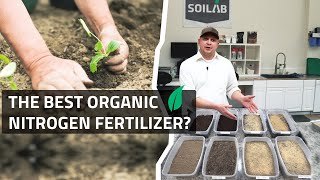What Is The Best Organic Nitrogen Fertilizer?
What Is The Best Organic Nitrogen Fertilizer?

We use the MySoil soil test for all of our analysis https://www.mysoiltesting.com/
What Is The Best Organic Nitrogen Fertilizer?

We use the MySoil soil test for all of our analysis https://www.mysoiltesting.com/
Really good information. Thank you.
Super helpful. Thanks!
Too much nitrogen release, too fast. It’ll burn your "tomatoes".
Use .05-0-0 ( half of 1%)
Worm Castings in a tea topping into the " fruiting" stage with Unsulfered Molasses pH 8.5.
You’ll need to add some pH down or citric acid
I.E. Pineapple juice pH 5
Lemon juice pH 2.5
Cherry juice. They also add sugars to feed good bacteria and nutrients.
As well as flavor in the late stages of your "tomatoes" cannibalize stage😂
A small amount of 12-0-0
1/4 tsp per gallon of soil
to amend built soil along w 2 cups composted cow manure 😉
That was very useful information;thanks!
All I know about gardening—mainly—is to ensure that all perennial weeds have been killed for least one year before even attempting to start any garden. Wheat is a good crop to grow to compete with perennial weeds because it is a Allopathic.
The soil tech that tested the samples from my sisters lawn said that sevrn percent organic matter is pretty high for a lawn.
Awesome work guys. Love this type of content. Keep it coming!
i grew pop corn in a kitchen dish washing bucket that i used soldering iron to make holes beneath. when abt a feet high i scissored it down to soil level and dropped the rest down thennplaced a pot ocer it w a plant that i water daily. the stuff that gtrew in that spot grew sooo green so large so strongly. cover it for 2 weeks and add red wigglers 5 of em or so
Good content Matt – looking forward to the 2022 growing season!
Great stuff Matt.
Thank you so much for the content I subscribed love it! Have you done comparisons with compost in the mix?
So interesting. I’ve been making custom soil blends for my farm seedlings for years now, and it is so much superior than going with store bought. I have been trying to learn how to make my own custom liquid organic hydroponic fertilizers, and this is exactly why I have not given up and just gone synthetic fertilizer route, because you miss out on just so much quality when you work with chemical sterilization. Although it’s far cheaper and don’t have to make compost teas for two weeks ahead of use. But with hydroponics it’s all fairly systemitized to the point I know how much water each batch will generally use, and plot out fertilizer use from that.
Hey Matt — I just stumbled across this after watching your recap on using Alfalfa meal. This was super useful and directly applicable, really enjoyed it. Would love to see a similar breakdown of bone meal and any non-animal-based organic alternatives. Also, based on your findings, is amending Alfalfa mean into a mix that already contains blood meal worthwhile or would it cause problems?
It’d also be great to see something covering different soil amendments’ effectiveness with different types of veggie crops based on your analysis, with recommendations. It’s a real pain to find this kind of information out there that’s not just purely anecdotal without reading lengthy studies. Thanks again, this was much appreciated!
Interesting! Why did you go for soybean vs alfalfa?
how would biochar make a difference.
Great video…… I was wondering as I go Fertilizer shopping I want to Know the best/worst sources of Nitrogen, Phosphorus, and Potassium..
Strange you are getting insect activity in potting soil, I would’ve thought the 50/50 mix would have insect activity
Excellent!
Hi,
May i use Nitrogen to preserve any FOOD OIL?
thanks a lot.
Very interesting… Thank you. You have a New subscriber
Bruh, a soybean meal was labeled twice, and the Y axis was also inconsistent. This could cause you to fail a lab report if you were in college
Thanks for doing this!
Amazing content thanks for sharing, Very useful information. U am planning to mix Mustered seed cake , Soy meal cake , Peanut cake and some Neem cake and use it for my bonsai trees
I add a bunch of microbes to my soil, a lot of worm castings and compost my raised beds are wicked rich and able to break down organic fertilizers really really really fast
Interesting results! Can you share the following about how the tests were conducted? 1. Were the amendments just scratched into the soil surface or were they incorporated throughout the entire sample? 2. How was the sample collected for testing? Was the entire sample mixed? What volume of soil was collected? 3. How were the samples analyzed? The main question I have- if the amendments are scratched into, let’s say, the top 2 inches of soil, how affective is this in supplying adequate nutrients deeper at the root level of an established perennial? Maybe this is a different test all together. Thank you so much for your time!
This test with the blood meal explains why my onions didnt react for like 5 weeks to my blood meal addition to my raised bed which is part native soil part compost.
Nuetrients vyalues in plant,animal kingdum useing eliments inorganic farming cultivation Pdf/booklet conway please sir